The Best Mulch For Tomatoes: Top Picks To Grow Juicy Delicious Tomatoes
Title: The Best Mulch for Tomatoes: Top Picks to Grow Juicy Delicious Tomatoes
Introduction:
Tomatoes are a delicious and popular vegetable that can be grown in many different climates. However, growing tomatoes can be challenging, especially in hot, dry climates. One way to improve your chances of growing healthy, productive tomato plants is to use mulch. Mulch helps to retain moisture in the soil, suppress weeds, and protect tomato plants from pests and diseases.
There are many different types of mulch that can be used for tomatoes. Some of the most popular options include:
- Straw: Straw is a lightweight and organic mulch that is easy to find and apply. It helps to retain moisture in the soil and suppress weeds.
- Wood chips: Wood chips are another organic mulch that is effective at retaining moisture and suppressing weeds. They can also help to improve the drainage of the soil.
- Compost: Compost is a nutrient-rich mulch that can help to improve the health of tomato plants. It also helps to retain moisture and suppress weeds.
- Grass clippings: Grass clippings are a free and easy-to-find mulch that can be used around tomato plants. They help to retain moisture and suppress weeds, but they can also attract pests.
- Peat moss: Peat moss is a lightweight and organic mulch that helps to retain moisture and improve drainage. However, it can be expensive and not as effective at suppressing weeds as other types of mulch.
Main Content:
The best mulch for tomatoes will depend on your individual circumstances. If you live in a hot, dry climate, you will need a mulch that is good at retaining moisture. If you have a lot of weeds in your garden, you will need a mulch that is effective at suppressing weeds. And if you are looking for a mulch that is free or inexpensive, you will need to choose a mulch that is readily available.
Here are some of the factors to consider when choosing the best mulch for tomatoes:
- Moisture retention: Mulch that is good at retaining moisture is important for tomatoes, especially in hot, dry climates. Straw, wood chips, and compost are all good choices for moisture-retaining mulches.
- Weed suppression: Mulch that is effective at suppressing weeds is also important for tomatoes. Straw, wood chips, and compost all help to suppress weeds, but grass clippings can attract pests.
- Cost: Mulch can range in price from free (grass clippings) to expensive (peat moss). If you are on a budget, you will need to choose a mulch that is free or inexpensive.
- Availability: Mulch may not be readily available in all areas. If you live in a rural area, you may have to order mulch online or from a specialty nursery.
Conclusion:
Mulch is an important part of growing healthy, productive tomato plants. By choosing the right mulch for your individual needs, you can help to improve the moisture retention, weed suppression, and drainage of your soil. This will give your tomato plants the best possible chance to thrive and produce delicious tomatoes.
Mulching your tomato plants is a great way to improve their health and productivity. It helps to retain moisture in the soil, suppress weeds, and protect the fruit from rot. There are many different types of mulch that you can use for tomatoes, but some of the best include straw, shredded leaves, and grass clippings.
To mulch your tomato plants, simply spread a 2-4 inch layer of your chosen mulch around the base of the plant. Make sure to keep the mulch away from the stem of the plant, as this can encourage rot. You can also mulch between the rows of tomato plants to help suppress weeds.
For more information about mulching for tomatoes, please visit Home Gardening.
FAQ of mulch for tomatoes
- What is mulch, and why should I use it for my tomatoes?
Mulch is a layer of organic material that is spread around the base of plants. It helps to suppress weeds, retain soil moisture, and regulate soil temperature. Mulch can also help to improve the overall health of your tomato plants by providing them with a more stable environment.
- What are some good materials to use for mulching tomatoes?
There are many different materials that can be used for mulching tomatoes, but some of the most popular options include:
* Straw
* Wood chips
* Pine needles
* Shredded bark
* Peat moss
- How much mulch should I use around my tomato plants?
The amount of mulch you need to use will vary depending on the size of your plants and the type of mulch you are using. However, a good rule of thumb is to apply a layer of mulch that is 2-4 inches thick.
- When should I apply mulch to my tomato plants?
You can apply mulch to your tomato plants at any time during the growing season. However, it is best to apply it in the spring, before the plants start to grow vigorously.
- How do I keep my mulch from blowing away?
If you live in an area with windy conditions, you may need to take some steps to keep your mulch from blowing away. One way to do this is to use a heavy-duty mulch fabric. You can also anchor the mulch in place with rocks or stakes.
- What are some of the benefits of using mulch for tomatoes?
There are many benefits to using mulch for tomatoes, including:
* Suppresses weeds: Mulch can help to suppress weeds by blocking out sunlight and preventing them from germinating.
* Retains soil moisture: Mulch helps to retain soil moisture by slowing down evaporation. This can be especially helpful during hot, dry weather.
* Regulates soil temperature: Mulch can help to regulate soil temperature by keeping the soil cooler in the summer and warmer in the winter.
* Improves drainage: Mulch can help to improve drainage by creating a layer of air space between the soil and the mulch. This can help to prevent waterlogged soils.
* Improves plant health: Mulch can help to improve plant health by providing a more stable environment for the roots. This can help to reduce stress and disease.
- Are there any risks associated with using mulch for tomatoes?
There are a few potential risks associated with using mulch for tomatoes, including:
* Pests and diseases: Mulch can provide a habitat for pests and diseases. It is important to inspect your mulch regularly for signs of problems.
* Fire hazard: Mulch can be a fire hazard, especially if it is made from organic materials. It is important to keep mulch away from heat sources and to water it regularly during dry weather.
* Soil compaction: If mulch is applied too thickly, it can compact the soil and make it difficult for water and air to reach the roots of the plants. It is important to apply mulch at the recommended depth.
Image of mulch for tomatoes
10 different images of mulch for tomatoes that are free to use:
- Wood chips are a popular mulch for tomatoes because they help to retain moisture, suppress weeds, and improve the drainage of the soil. They are also relatively inexpensive and easy to find.
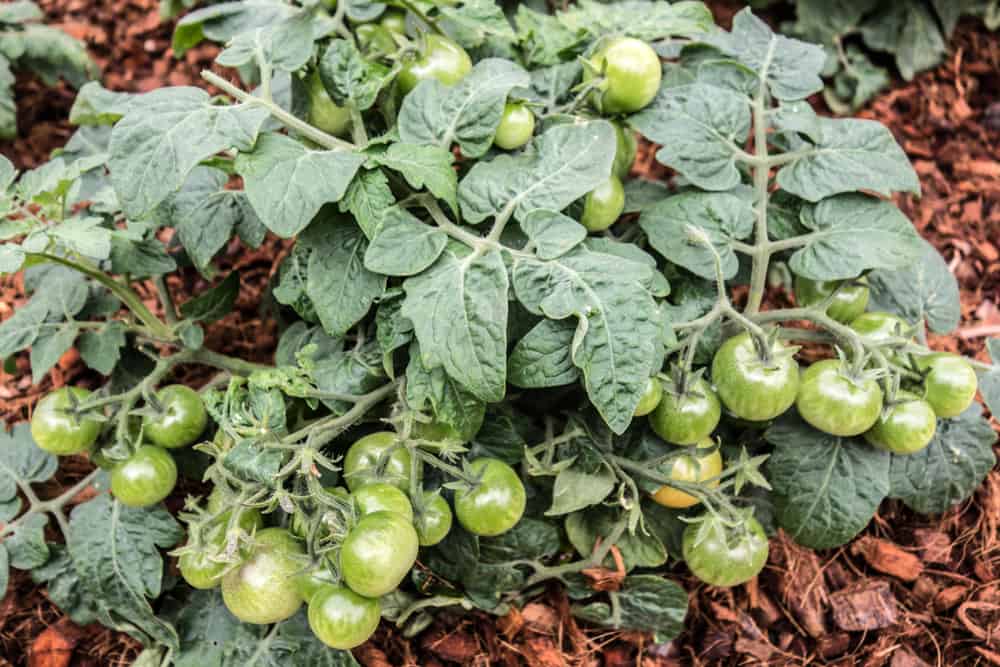
- Pine needles are another good option for mulching tomatoes. They are acidic, which can help to prevent blossom end rot in tomatoes. Pine needles are also a good source of nitrogen, which is essential for tomato growth.
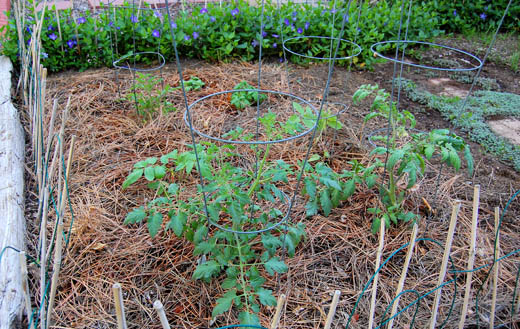
- Straw is a natural mulch that is often used for tomatoes. It helps to keep the soil moist and cool, and it also helps to suppress weeds. Straw is a good choice for organic gardening.
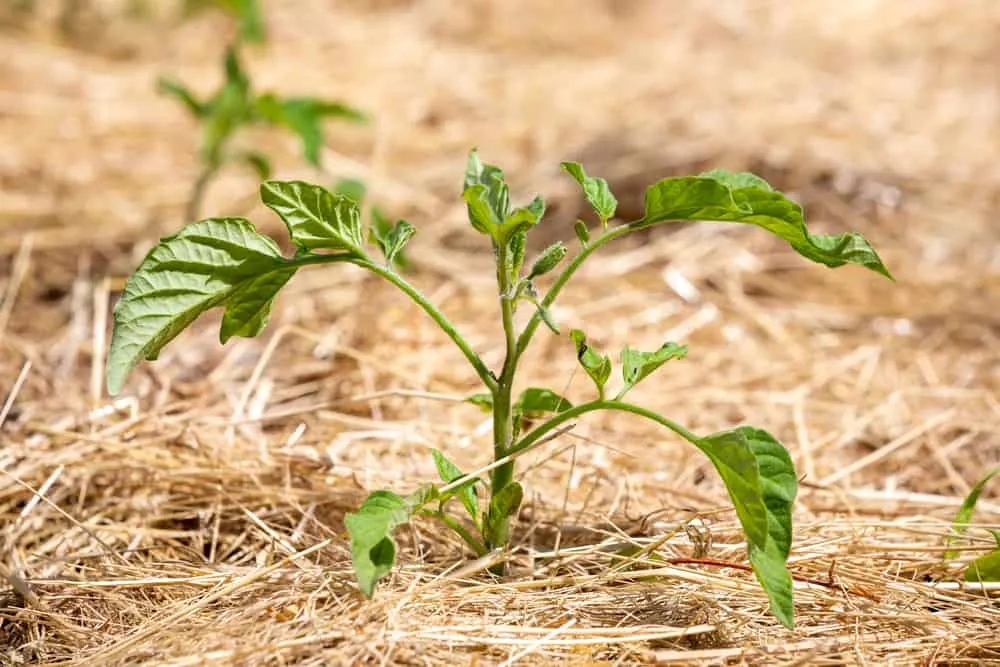
- Grass clippings are a free and easy way to mulch tomatoes. They help to keep the soil moist and suppress weeds. However, grass clippings can mat down and smother the plants if they are not applied correctly.
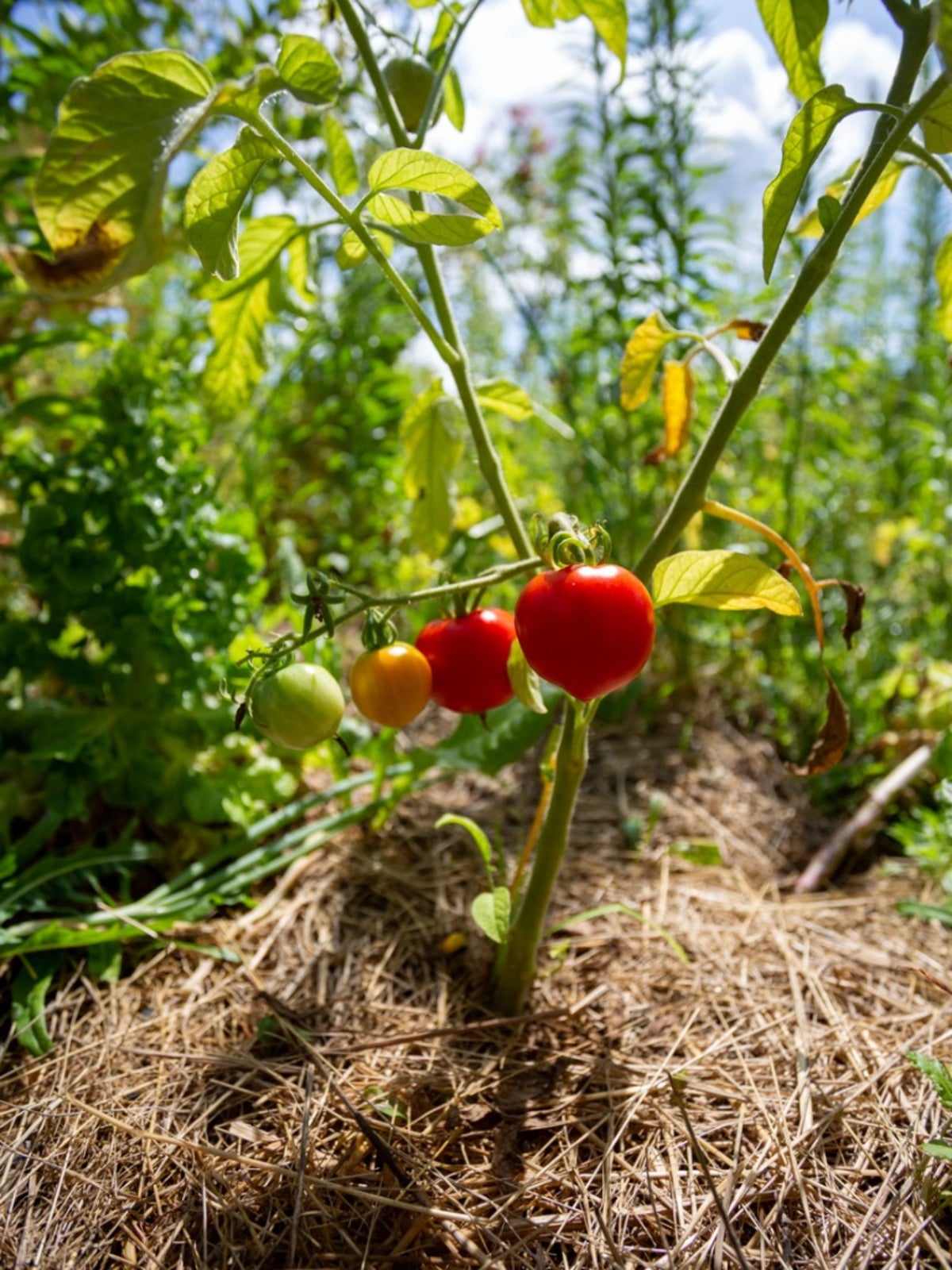
- Coffee grounds are a good source of nitrogen, which is essential for tomato growth. They can also help to improve the drainage of the soil. However, coffee grounds should be used sparingly, as they can be acidic and can damage the plants if they are applied too heavily.
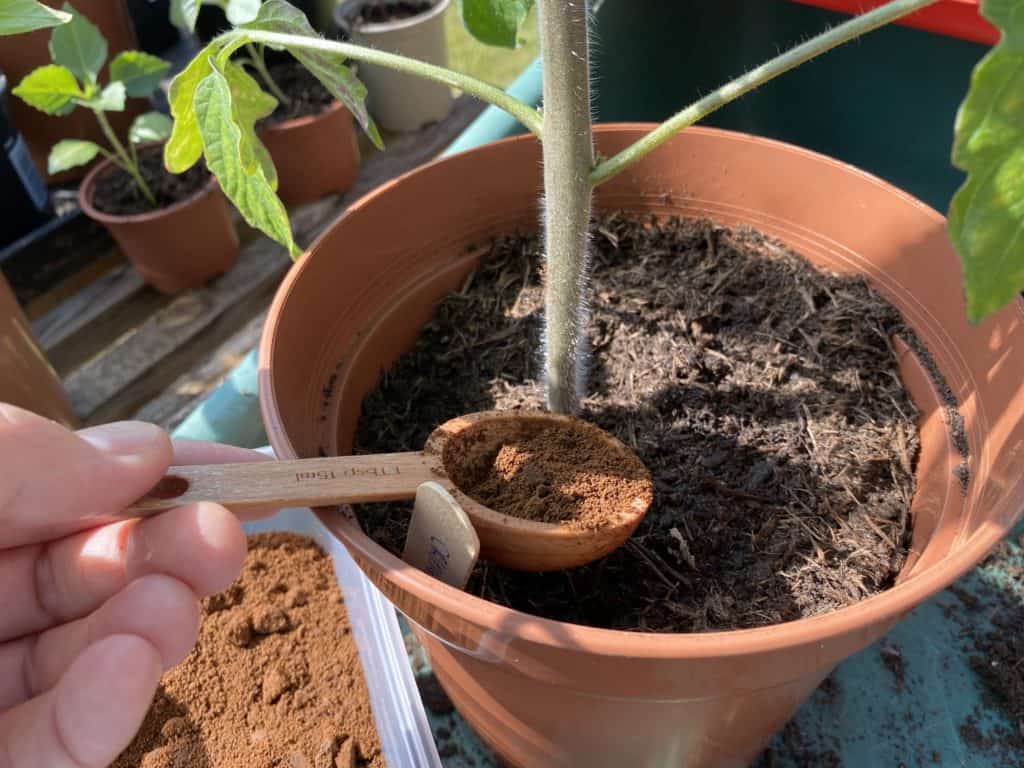
- Eggshells are a good source of calcium, which is important for tomato health. They can also help to deter slugs and snails. Eggshells should be crushed before they are applied to the soil.
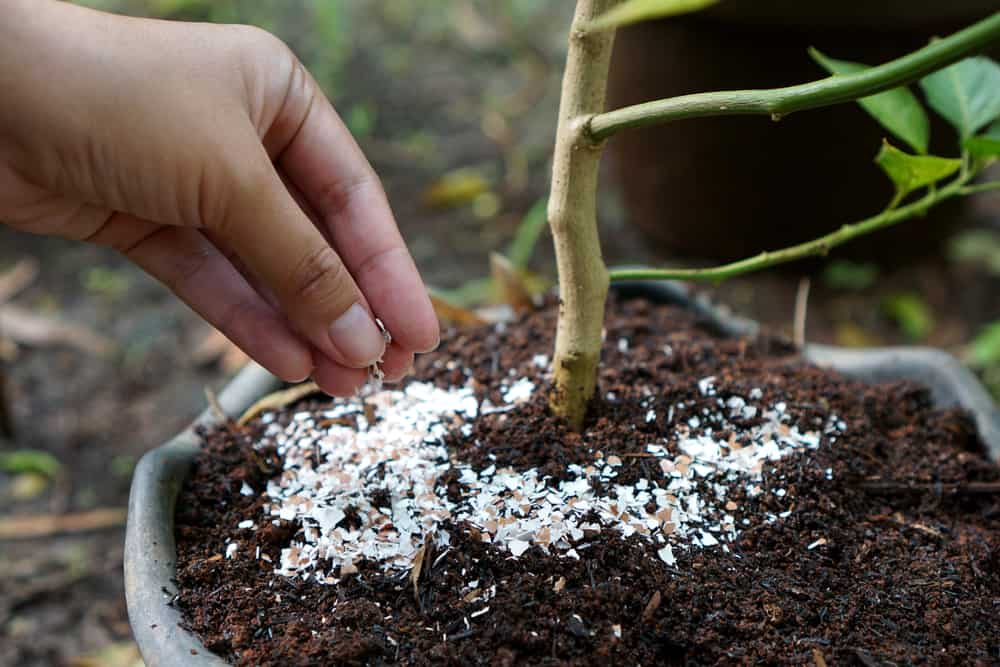
- Compost is a nutrient-rich mulch that is ideal for tomatoes. It helps to improve the drainage of the soil, retain moisture, and suppress weeds. Compost can be made at home or purchased from a garden center.

- Black plastic mulch is a type of synthetic mulch that helps to retain heat and moisture. It can be beneficial for tomatoes grown in cold climates. However, black plastic mulch can trap heat and moisture, which can lead to problems such as blossom end rot and pests.

- Rocks are a type of inorganic mulch that can help to retain moisture and suppress weeds. They are also a good choice for areas where weeds are a problem. However, rocks can make it difficult to weed the garden and can also damage the plants if they are not placed carefully.

- Gravel is another type of inorganic mulch that can be used for tomatoes. It is similar to rocks in that it helps to retain moisture and suppress weeds. However, gravel is more decorative than rocks and can make the garden look more finished.

Post a Comment for "The Best Mulch For Tomatoes: Top Picks To Grow Juicy Delicious Tomatoes"